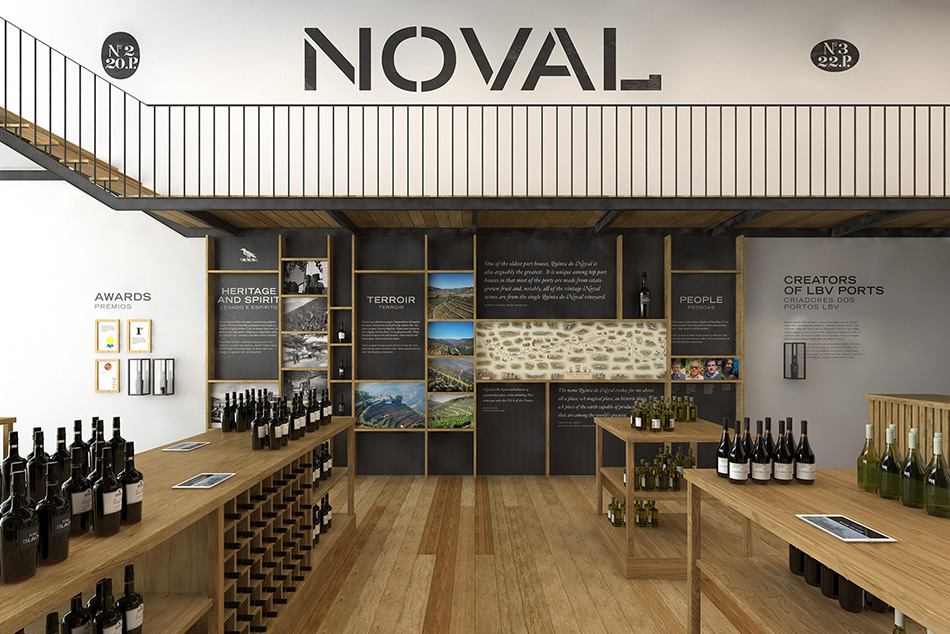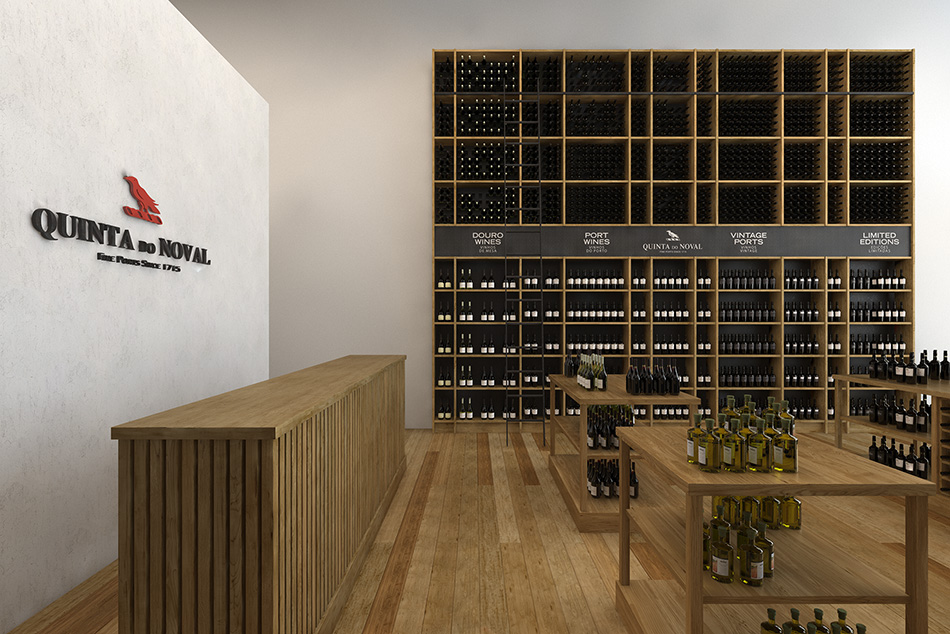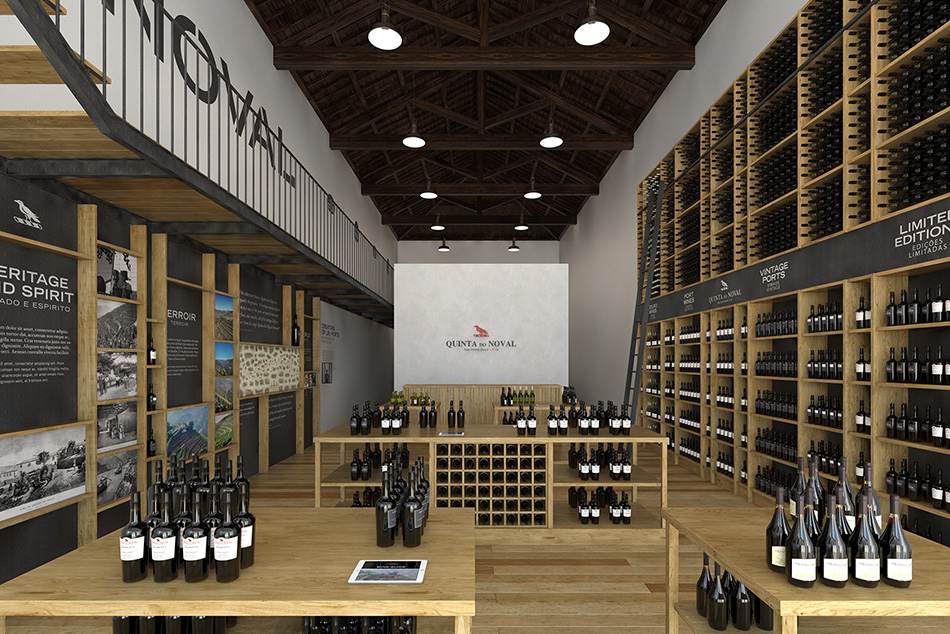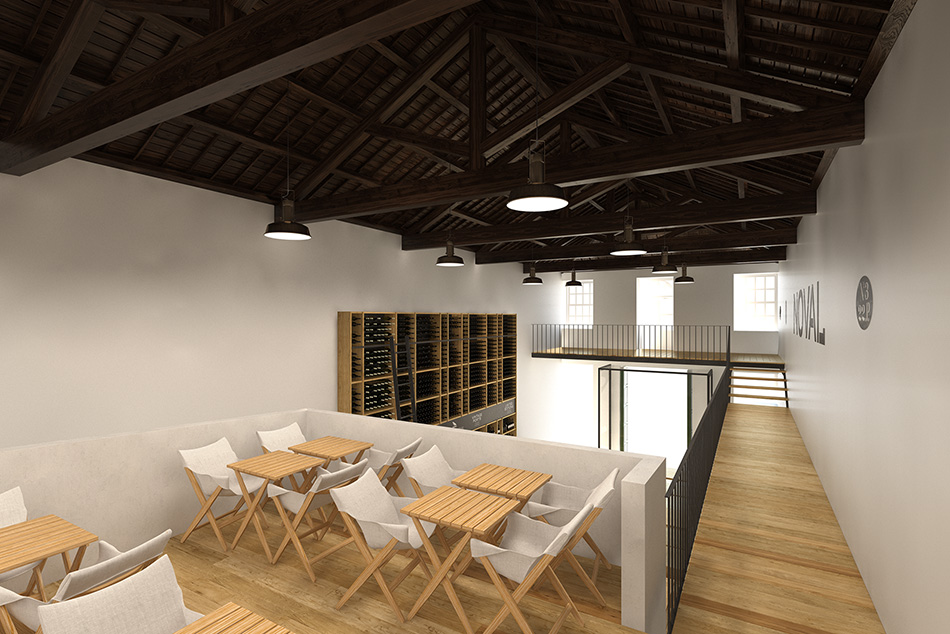Quinta do Noval shop and wine tastings




FBA.ís design bid for the Quinta do Noval Wine Tastings and Shop in Pinh„o combined functionality, elegance and Quinta do Noval heritage. The end result was a refined yet friendly and welcoming space conveying the legacy of the Quinta. The general atmosphere took inspiration from the ambience of the Douro ďadegasĒ and specifically Quinta do Novalís ďadegaĒ.
The materials suggested for the architectural intervention - whitewashed walls, dark wood, light pine, and black metal - complement each other in quiet harmony and are in line with the general heritage of the Douro wine regions and Quinta do Noval.
The intervention on the site aimed to combine the clientís brief, the spirit of the vernacular architecture of the Douro wine region and the pre-existing building. This refurbishment aimed to maintain all the essential characteristics of the building, such as the facade, where the new shop would be appropriately identified, or the whitewashed masonry of the interior walls. The ceiling was to maintain the traditional system of dark woodwork, emulating both the on site pre-existing system, as well as the one to be found in Quinta do Novalís adega. Given the very poor condition of the existing structure, a full makeover was planned, including further improvements, such as raising the back half to the same level as the front and equipping it with all the necessary infrastructures to guarantee a comfortable environment (e.g, lighting and air conditioning).
Raising the ceiling in the back of the building would allow to create a new area, without modifications on the existing walls, enabling more room to cater to the locationís planned services and experiences.
The shop area was planned to be close to the entry/exit of the premises. This enabled easy access for passing by visitors looking to buy fine wines or site specific gifts, without disturbing the wine tasting patrons. Shop visitors would direct access to most of the products, allowing them to pick up the articles and produce them at the counter to pay and check out freely. Our experience tells us this offers a less intimidating shopping experience, reduces the number of shop assistants needed and would result in a better flow of customers during peak hours, while also generating a higher number of articles bought by person. Limited closed displays would also be available to exhibit more valuable or exclusive articles.
Displays and counters were designed to have specific areas to show information about the products: port wine and the region in general. The walls of the shop area were be used to tell Quinta do Novalís story, through texts, historical documents and images. This would not only be a learning experience for the visitor but will also differentiate the shop, reminding
visitors that Quinta do Noval is one of the important pioneering and historic quintas, and arguably the most beautiful, in the heart of the oldest demarcated wine region in the world.
Wine tastings were to be located on a mezzanine towards the back of the building, providing a more secluded ambience for memorable experiences. The wine tasting area, apart from from the tables to seat the patrons, was to be equipped with a fully functional counter to support the wine tasting services. The access to the mezzanine was planned to be through a walkway resembling the risen walkways found in the adegas. Support facilities, such as toilets, storage and office
were to be located towards the back of the premises, under the wine tasting mezzanine.
The name of Quinta do Noval first appeared in land registries in 1715. Quinta do Noval made its name with the declaration of the 1931 Quinta do Noval Vintage Port, and the 1931 Quinta do Noval Nacional Vintage Port. This success established Quinta do Noval among the great names of Vintage Port in the English and American markets, a leading position in terms of reputation which is maintained today.
Runner-up design bid.
The materials suggested for the architectural intervention - whitewashed walls, dark wood, light pine, and black metal - complement each other in quiet harmony and are in line with the general heritage of the Douro wine regions and Quinta do Noval.
The intervention on the site aimed to combine the clientís brief, the spirit of the vernacular architecture of the Douro wine region and the pre-existing building. This refurbishment aimed to maintain all the essential characteristics of the building, such as the facade, where the new shop would be appropriately identified, or the whitewashed masonry of the interior walls. The ceiling was to maintain the traditional system of dark woodwork, emulating both the on site pre-existing system, as well as the one to be found in Quinta do Novalís adega. Given the very poor condition of the existing structure, a full makeover was planned, including further improvements, such as raising the back half to the same level as the front and equipping it with all the necessary infrastructures to guarantee a comfortable environment (e.g, lighting and air conditioning).
Raising the ceiling in the back of the building would allow to create a new area, without modifications on the existing walls, enabling more room to cater to the locationís planned services and experiences.
The shop area was planned to be close to the entry/exit of the premises. This enabled easy access for passing by visitors looking to buy fine wines or site specific gifts, without disturbing the wine tasting patrons. Shop visitors would direct access to most of the products, allowing them to pick up the articles and produce them at the counter to pay and check out freely. Our experience tells us this offers a less intimidating shopping experience, reduces the number of shop assistants needed and would result in a better flow of customers during peak hours, while also generating a higher number of articles bought by person. Limited closed displays would also be available to exhibit more valuable or exclusive articles.
Displays and counters were designed to have specific areas to show information about the products: port wine and the region in general. The walls of the shop area were be used to tell Quinta do Novalís story, through texts, historical documents and images. This would not only be a learning experience for the visitor but will also differentiate the shop, reminding
visitors that Quinta do Noval is one of the important pioneering and historic quintas, and arguably the most beautiful, in the heart of the oldest demarcated wine region in the world.
Wine tastings were to be located on a mezzanine towards the back of the building, providing a more secluded ambience for memorable experiences. The wine tasting area, apart from from the tables to seat the patrons, was to be equipped with a fully functional counter to support the wine tasting services. The access to the mezzanine was planned to be through a walkway resembling the risen walkways found in the adegas. Support facilities, such as toilets, storage and office
were to be located towards the back of the premises, under the wine tasting mezzanine.
The name of Quinta do Noval first appeared in land registries in 1715. Quinta do Noval made its name with the declaration of the 1931 Quinta do Noval Vintage Port, and the 1931 Quinta do Noval Nacional Vintage Port. This success established Quinta do Noval among the great names of Vintage Port in the English and American markets, a leading position in terms of reputation which is maintained today.
Runner-up design bid.




